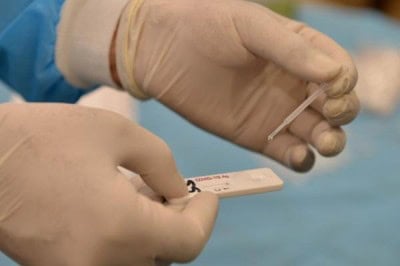New Delhi, Nov 27 : The simple and fast method of dry swab-direct RT-PCR, developed by CSIR’s constituent lab Centre for Cellular and Molecular Biology (CCMB), Hyderabad, for scaling up coronavirus detection has now been approved by the Indian Council of Medical Research, the apex body announced on Friday.
This method developed by CSIR-CCMB is a simple variation of the existing gold standard RT-PCR method and can easily scale up the testing by two to three fold with no new investment of resources.
After evaluating this method and finding an overall concordance of 96.9 per cent, the ICMR has now issued an advisory for the use of CSIR-CCMB dry swab method, considering its lesser cost and quick turn-around time.
CSIR-CCMB has been testing samples for coronavirus since April 2020. Having worked closely with the healthcare workers of Telangana, it identified some of the key issues that slow the testing process. In response to it, the researchers here developed the dry swab RNA-extraction free testing method for Covid-19.
More specifically, the dry swab-direct RT-PCR method involves collecting and transporting the nasal swab in dry state (as opposed to using the viral transport medium VTM) which makes the transportation and handling of the samples easy and less prone to spillage and spread of infection.
Secondly, the step of RNA isolation from the sample is omitted and involves only simple processing of the sample followed by direct RT-PCR using the kit recommended by ICMR.
Omitting the step of RNA isolation offers a huge benefit over the conventional method, as the RNA isolation is a major bottleneck in terms of time, cost and trained manpower.
Commenting on the development, the Director General of CSIR, Shekhar C. Mande, said that the method is easy to implement with no requirement of new kits and the existing manpower can perform this with no additional training and hence could make a significant contribution to ramping up the testing capacity in the country quickly.
Rakesh Mishra, Director, CCMB, said, “RNA extraction, even with automation, takes four hours for roughly 500 samples. VTM and RNA extraction both add a significant burden on money and time required for mass testing for coronavirus. We believe the technique’s merit holds for all kinds of settings and has the potential of bringing the costs and time of testing by 40-50 per cent.”
Significantly, the modified method of CSIR-CCMB has also been independently corroborated by multiple premier institutes and hospitals such as the Centre for DNA Fingerprinting and Diagnostics (CDFD), IISER-Berhapmur, CSIR-Neeri, GMCH-Nagpur, Genepath based in Pune, IGGMSH and MAFSU, Nagpur and also Apollo Hospitals, Hyderabad.
This modified method has been published in peer reviewed journal by CSIR-CCMB and across the globe by other scientific groups in several prestigious scientific journals across the world.
Disclaimer: This story is auto-generated from IANS service.

